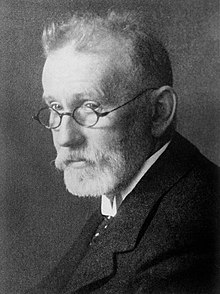 Global Information
Global InformationPaul Ehrlich information
Paul Ehrlich FRS | |
|---|---|
 | |
| Born | 14 March 1854 Strehlen, Lower Silesia, Prussia (now Strzelin, Poland) |
| Died | 20 August 1915 (aged 61) Bad Homburg, Hesse, German Empire |
| Citizenship | German |
| Known for | Chemotherapy Immunology Basophil Magic bullet Mast cell Receptor theory Side-chain theory Ehrlich's reagent |
| Spouse | Hedwig Pinkus (1864–1948) (m. 1883; 2 children) |
| Children | Stephanie and Marianne |
| Awards | Nobel Prize in Physiology or Medicine (1908) Cameron Prize of the University of Edinburgh (1914) |
| Scientific career | |
| Fields | Immunology |
| Thesis | Beiträge zur Theorie und Praxis der histologischen Färbung (1878) |
| Notable students | Hans Schlossberger |
| Signature | |
 | |
Paul Ehrlich (German: [ˈpaʊl ˈʔeːɐ̯lɪç] ; 14 March 1854 – 20 August 1915) was a Nobel Prize-winning German physician and scientist who worked in the fields of hematology, immunology, and antimicrobial chemotherapy. Among his foremost achievements were finding a cure for syphilis in 1909 and inventing the precursor technique to Gram staining bacteria. The methods he developed for staining tissue made it possible to distinguish between different types of blood cells, which led to the ability to diagnose numerous blood diseases.
His laboratory discovered arsphenamine (Salvarsan), the first antibiotic and first effective medicinal treatment for syphilis, thereby initiating and also naming the concept of chemotherapy. Ehrlich popularised the concept of a magic bullet. He also made a decisive contribution to the development of an antiserum to combat diphtheria and conceived a method for standardizing therapeutic serums.[1]
In 1908, he received the Nobel Prize in Physiology or Medicine for his contributions to immunology.[2] He was the founder and first director of what is now known as the Paul Ehrlich Institute, a German research institution and medical regulatory body that is the nation's federal institute for vaccines and biomedicines. A genus of Rickettsiales bacteria, Ehrlichia, is named after him.[3]
Ehrlich has been called "father of immunology."[4][5]
- ^ "Paul Ehrlich". Science History Institute. June 2016. Retrieved 20 March 2018.
- ^ "The Nobel Prize in Physiology or Medicine 1908, Paul Ehrlich – Biography".
- ^ Thomas, Sunil; Popov, Vsevolod L.; Walker, David H. (20 December 2010). "Exit Mechanisms of the Intracellular Bacterium Ehrlichia". PLOS ONE. 5 (12): e15775. Bibcode:2010PLoSO...515775T. doi:10.1371/journal.pone.0015775. ISSN 1932-6203. PMC 3004962. PMID 21187937.
- ^ https://www.kcr.uky.edu/training/fall18/Immunotherapy%20for%20Cancer%20%20final.pptx
- ^ "A Look Ahead XVIII: Explorations in Transformative Research". YouTube.